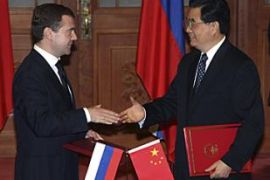Russia and China condemn US shield
Dmitry Medvedev and Hu Jintao criticise plan for missile defence system.

The plan to deploy parts of the missile shield in eastern Europe to counter possible rocket launches by “rogue” states such as Iran has unnerved Moscow, which sees the project as a threat to its security.
The defence system fits into what Moscow sees as Western attempts to contain its ambitions to reassert itself as a world power and keep Russian companies out of lucrative markets.
Moscow is therefore keen to shore up support in China, which it sees as a potential ally against Western power.
Medvedev and Hu also found common ground on human rights, which both countries frequently say the US uses as political leverage to criticise them.
The presidents’ statement said: “Both sides are concerned about the universal nature of the principle of respecting human rights, but believe that every state has a right to encourage and protect them based on its own specific features and characters.
“On the issue of human rights … (we should) oppose politicising the issue and using double standards, and should oppose using human rights to interfere with other countries’ affairs.”
Nuclear deal
China and Russia have also worked together to water down sanctions against Iran over its nuclear programme by using their permanent membership on the UN Security Council.
Both countries are also involved in multilateral talks to rein in North Korea’s nuclear programme and have proposed a treaty to ban weapons in space.
Despite their co-operation, the new Russian president knows that he has to address concerns at home about China’s growing military and economic clout and its rivalry for influence in resource-rich Central Asia.
Medvedev arrived a day after visiting neighbouring Kazakhstan, a country seen as key to Moscow’s strategy of keeping Central Asia’s gas out of Western hands and a rival supplier for China’s prodigious energy appetite.
Earlier on Friday, Russia’s nuclear chief said Moscow would build and supply a $1bn uranium enrichment plant in China.
Sergei Kiriyenko, the head of Rosatom, the state nuclear corporation, said: “The Chinese market is very attractive and we are trying to enter it in two ways, not only by supplying fuel but also investing in local production.”